Triumph Street Triple R, Street Triple RS review: refined aggression
Sharper, faster and better-equipped than ever. We ride the 2023 Triumph Street Triple R and RS.
Published on Mar 03, 2023 10:00:00 AM
23,437 Views
Follow us on


RS’ Brembo Stylema calipers are exceptional.

New tank is shaped to offer more purchase for the knees.
The Triumph Street Triple R and the RS have already established themselves as some of the finest sport nakeds in the segment. Fast, nimble and feature-packed are some of their glowing qualities. With a recipe so good, I can’t fathom how difficult it must have been for Triumph to make significant changes to the bikes in the quest for making the 2023 versions sharper and more capable than ever before. A couple of days in Spain with the R on the road, and the RS on both on the road and the awesome Jerez racetrack gave us an idea of what they’ve brought to the table.
Triumph Street Triple R, Street Triple RS: engine and performance
The Street Triple’s fantastic inline-three engine has always been the heart and soul of the bike. For 2023, Triumph employed the services of their Moto2 engine development team to make several changes and extract more performance from it. This includes new pistons, con rods, shorter intake trumpets as well as a new camshaft and increased valve lift. The compression ratio has also been bumped from 12.65:1 to 13.25:1. The result is a more powerful engine (120hp in the R and 130hp in the RS) that also makes more torque at 80Nm.
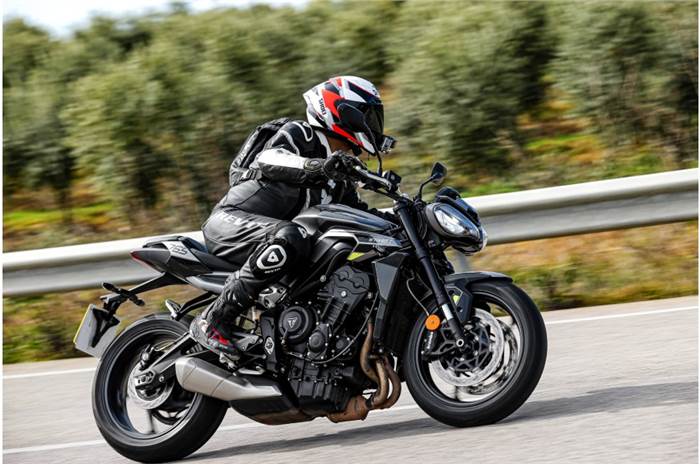
The other major change has been made to the gearing (on both models) with the 1st gear being taller while the rest of the cogs are now a little shorter. The final drive ratio is shorter (2-teeth bigger sprocket at the back and one down at the front) as well and all of these tweaks have made the engine more responsive. Lastly, a new, freer-flowing exhaust has been fitted on both bikes. The question now is, what effect have these changes had on an already incredible engine?
Beginning with the Street Triple R, we rode the bike across the gorgeous countryside around Jerez with plenty of tight and twisty roads in the mix. In such scenarios, the engine’s improved responsiveness made the ride quite entertaining. I never found myself falling out of the meat of the engine’s powerband, even at times when I was in third gear instead of second while exiting a corner. That along with the engine’s already tractable nature results in a bike that’ll be quite at home in the city as well as a fast ghat section.
It’s a similar story with the RS that we sampled on the same roads during the latter half of the day. Albeit with 10 more horses at my disposal, there’s no denying that the RS was even more involving to ride. All said, the benefits of the new gearing shone brighter at the racetrack. The engine response felt quicker out of some of the tighter sections of the track, like Turn 2 and the Turn 6 hairpin, for example. Again, there were times when I was in a gear higher than what I’d thought was ideal, but the engine remained on the boil as I exited the corner.
The best part, however, is when the revs climb north of the 7,000rpm. The extra horses make their presence felt as the bike darts towards the horizon in what I can best describe as absolute entertainment. The engine also revs a little higher now, going up to 12,000rpm from 11,750rpm and that always spices things up.
Considering the shorter gearing, there’s probably a small impact on the bike’s top speed, however, Triumph wouldn’t disclose figures when we asked.
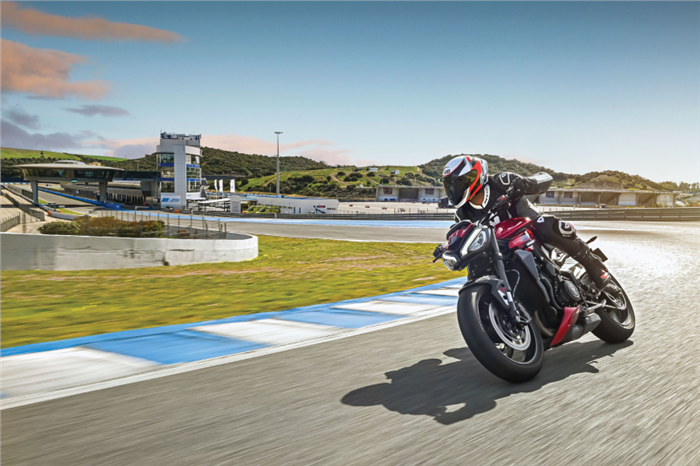
The up/down quickshifter (also on the R) worked as advertised, although it could’ve been a tad smoother during downshifts. But this niggle can be overlooked for the pure aural ecstasy emanating from the new exhaust. To my ears, it sounds louder, deeper, richer and sweeter than before. It’s good enough that I’d never want to slap on an aftermarket exhaust, but if you’d want to do so, it’ll be an expensive affair. That’s because the new exhaust and collector box is one unit, which eliminates the possibility of fitting a slip-on aftermarket exhaust and you’ll have to fit a full system instead.
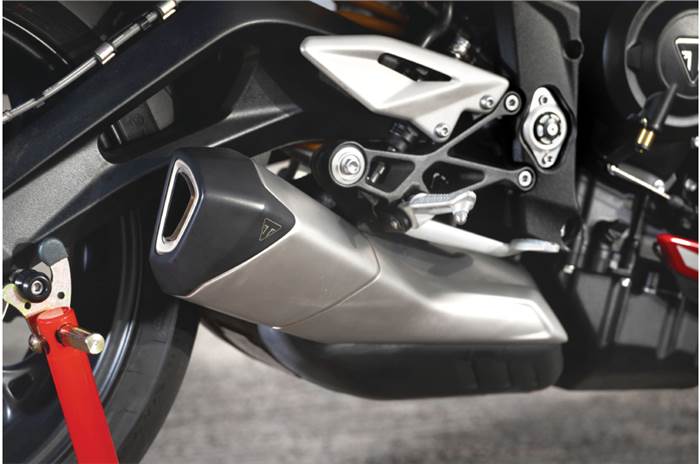
To sum up, the Street Triple 765’s engine along with the new gearing has made the bike feel livelier than before and that is a good thing. Think of it as an engine that delivers thrilling performance, and while it’s still no KTM-style hooligan, it focuses more on smooth, precise and extremely quick performance. That said, it’s not just the engine but also the other changes that have made the bike better than before.
Triumph Street Triple R. Street Triple RS: chassis and handling
We’ve always loved the Street Triple for its ultra-sweet chassis. Its handling, especially the RS’, has been the defining feature of the bike and for 2023 a few tweaks have made it an even more potent corner slayer, and how! While the R and RS have a sharper rake angle and reduced wheelbase, the latter also gets a raised back end by means of adding a 20mm spacer at the monoshock. The RS’ riding position, hence, is sportier with a little more weight on the front, without being uncomfortable in any way. The R and RS also get a 12mm wider handlebar for more leverage, and when you couple that with the sharper steering angle, what you’ve got is a Street Triple that changes direction almost telepathically.
.jpg&c=0&w=700)
Whether it was on the road or the racetrack, the bike flowed from corner to corner with minimal effort and such precision that it further cemented itself as one of the best motorcycles out there when it came to handling. Adding that extra dollop of confidence was the ABS and traction control system, that’s finally lean-sensitive, courtesy the new IMU. I never managed to trigger the TC on the racetrack, such was the grip levels of the chassis and RS’ Pirelli Supercorsa SPs. It wasn’t the same story with the R on the road. There were a couple of instances where we encountered slippery tarmac, and thankfully, traction control intervened and saved us from potential disaster. That said, the way the system chops power isn’t as refined as you’d experience on bikes like the Ducati Monster. Also, the R now gets Continental ContiRoad tyres that are decent, but not as grippy or feelsome as the Pirelli Diablo Rosso II tyres it replaces.
The suspension components on both bikes have been carried over, although the damping has been tweaked a little to account for the sharper steering angle. Out on the road, the difference in R and RS’ superior suspension was evident in the way they gobbled a variety of bumps and broken roads, the latter being more absorptive – although Triumph had specially set up the RS suspension to be more absorptive on the road.
As for the brakes, the new Brembo Stylema calipers on the RS offer magnificently strong bite, even better than the previous M50 monoblocs, which were already quite strong to begin with. Also, the brakes are linked for better braking performance, and while it works well, this feature is disengaged in track mode.
Triumph Street Triple R, Street Triple RS: design and features
The new Street Triple looks sharper and, to my eyes, better looking. That’s mainly got to do with the smaller, sleeker 15-litre fuel tank, new tank extensions and the new flyscreen above the headlight. Add to this the new colour options, especially the one in yellow, and you’ve got a looker. However, if you desire a street fighter with big road presence, like the Kawasaki Z900, the Triumph won’t fit the bill. Nevertheless, the Street Triple carves an identity for itself with its unique looks while the build quality is among the best in the segment.
.jpg&c=0&w=700)
In terms of equipment, it is largely the same as before for both bikes, save for the new customisable ‘Rider moder’ and Trident 660 style, TFT-LCD instrument cluster on the R with Bluetooth connectivity as an option. Speaking of, Triumph is also offering cruise control as an optional extra on the RS.
Triumph Street Triple R, Street Triple RS: first impressions
Triumph hasn’t left any stone unturned in sharpening the Street Triple and it clearly shows in the way the bike performs. More importantly, the difference between the R and RS is wider than before and that begs the question. Which Street Triple should one choose?
To put it simply, the R is for those who want a quick, everyday city bike and the flexibility to ride it hard up a canyon road on the weekend or the occasional track day, with the suspension dialled in accordingly.
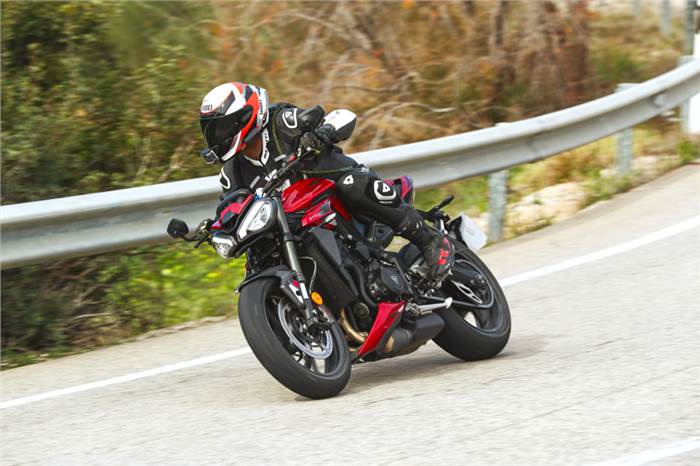
The RS, on the other hand, is for those who want the versatility of a road bike that is also more than capable of keeping an equivalent supersport honest on a racetrack. This is without being anywhere near as uncomfortable as a supersport. In many ways then, the RS is the one that I’d go for, given the fact that it’s one helluva motorcycle.
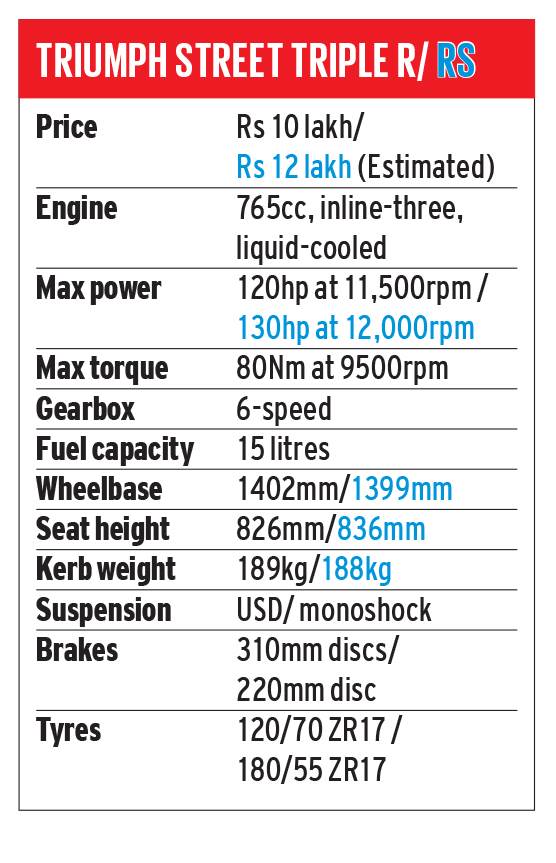
Also See:
2023 Triumph Street Triple R, RS video review
Copyright (c) Autocar India. All rights reserved.




























Comments
Member Login
Personal Details
No comments yet. Be the first to comment.